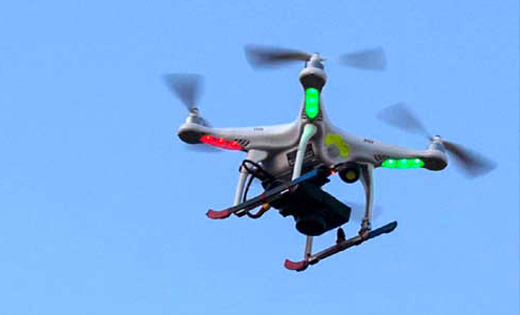Drones to catch mosquitoes and help stop epidemics
Drones to catch mosquitoes
Washington, Jun 16, 2015, PTI: Researcher uses mosquitoes, drones & cloud computing to prevent the spread of disease. Microsoft researchers are developing autonomous drones that collect mosquitoes to look for early signs that potentially harmful viruses are spreading, with the goal of preventing disease outbreaks in humans.
Project Premonition, launched by American tech company Microsoft, is developing a system that aims to detect infectious disease outbreaks before they become widespread.

Project Premonition could eventually allow health officials to get a jump start on preventing outbreaks of a disease like dengue fever or avian flu before it occurs, whether or not it is a disease spread by mosquitoes, researchers said.
It will do that by relying on what Ethan Jackson, the Microsoft researcher who is spearheading the project, calls ’nature’s drones’ - mosquitoes - to look for early signs that a particular illness could be on the move. Researchers have developed a new mosquito trap that uses less energy and relies on lighter weight batteries.

It also has a new bait system for luring mosquitoes, a sensor that automatically sorts the mosquitoes from the other bugs and chemicals that can preserve the mosquitoes for lab study. It is expected to be significantly cheaper and lighter than current traps. The team will use drones that can fly the mosquito traps into and out of remote areas in a semi-autonomous way, rather than having to be constantly directed from the ground.
Microsoft researchers are beginning to develop ways to make the drones even more autonomous, and they are also working with US Federal Aviation Administration officials on regulatory requirements, according to a post on the company’s blog.
Once the mosquitoes have been collected, the next challenge is to analyse them for microbes and viruses that could pose a threat to humans. Until recently, the idea of culling through mosquitoes to try to find diseases that are both known and unknown would have been wildly impractical, according to James Pipas, a professor of molecular biology at the University of Pittsburgh who also is working on Project Premonition.
But now, the latest developments in molecular biology and genetic sequencing are allowing researchers to cull through samples to look for multiple viruses, including ones that have not been discovered yet.
Researchers can then create cloud-based databases of the information they find, and come up with algorithms for evaluating which of these viruses could present a threat to humans or animals that humans rely on. Pipas expects that it will be very difficult to figure out which of the viruses they identify in mosquitoes are a threat, but he also said such a system holds incredible promise for preventing outbreaks.
- Former don Muthappa Rai’s son injured after being shot at in moving car near Bidadi house
- Mulki: Top portion of Bappanadu temple chariot collapses during Rathotsava; none hurt
- Belthangady youth slips to death in Cauvery river
- Kundapur: Speeding Omni fatally knocks down pedestrian
- Snehalaya and Janamaithri Police launch anti-Drug awareness drive at Uppal and Hosangadi
- Mangaluru: Fight will continue till amendments to Waqf Act are withdrawn, say Muslim leaders
- Direction to remove Janivara would have come with the knowledge of the govt., says Poojary
- JEE (Main) second edition results to be announced by April 19: NTA
- Three arrested for raping woman in Mangaluru, say police
- Summer rush: Special trains, Vande Bharat sleeper announced for Mangaluru
- Mangaluru: Yellow alert issued as thunderstorms expected across coastal Karnataka
- Mangaluru: Bride-to-be goes missing a day before wedding in Bolar
- Puttur: Grand Brahmarathotsav at Shri Mahalingeshwara Temple draws thousands with devotion and splendor
- Caste census report politically motivated, says R Ashoka
- PM Modi to visit Saudi Arabia from April 22-23
- 4 dead, many feared trapped as building collapses in Delhi’s Mustafabad
- Kerala teacher acquitted as student confesses fake rape allegation
- CET officials booked for asking students to remove sacred thread at exam centre in Shivamogga
- BJP worker found hanging in Bengaluru outskirts, video message names ‘local leader’
- CET row: Karnataka govt orders probe after students asked to remove sacred thread
- Man who flashed woman, assaulted 7 people arrested in Bengaluru
- FIR against Sunny Deol, Randeep Hooda for offending Christian religious sentiments in Jaat
- 22 maoists surrender before security forces in Chhattisgarh’s Sukma
- Indian Embassy repatriates 4 nationals scammed in Myanmar’s Myawaddy
- ED debunks Bengaluru man’s claims of importing Rs 50-crore wolfdog
- Skills and Competencies Take Center Stage at MSN Dialogue Series
- Court remands Maoist Lakshmi to six-day police custody
- Sandhya Shenoy honored with Society for Materials Chemistry Medal-2024
- White Cornus Apartment in Mangaluru
- City girl wins first place in state-level spell bee competition
- Alleged ‘Love Jihad’ Case in Mangaluru: Woman left home voluntarily, says police
- Girl fatally struck by reckless two-wheeler near Belman
- New residential complex for the judges inaugurated in Mangaluru
- Absconding accused nabbed after 8 years
- Truck with cylinders turns turtle in Beltangady
- Bhoota Kola artist dies of cardiac arrest
- Development of the country should be our goal: Ganesh Karnik
- Container truck gets stuck under Modankap railway bridge
- Truck crushes bike’s pillion rider near BC Road
- Head constable dies of heart attack
- CITY INFORMATION
- TRAVEL
- TOURIST INFORMATION
- HEALTH CARE
- MISCELLANEOUS




 Write Comment
Write Comment E-Mail To a Friend
E-Mail To a Friend Facebook
Facebook Twitter
Twitter  Print
Print 


